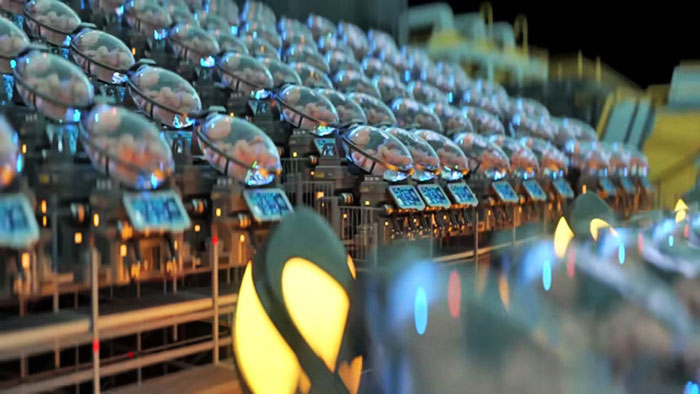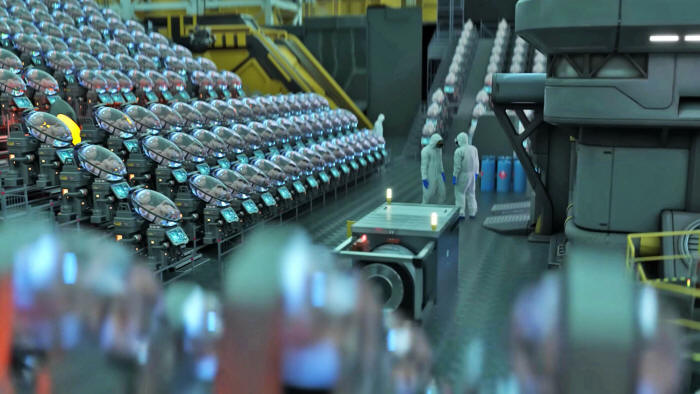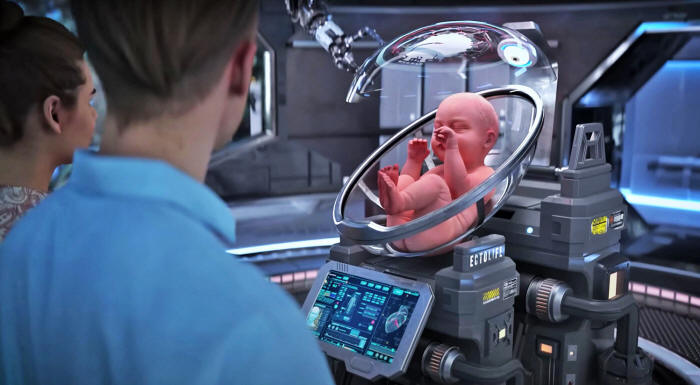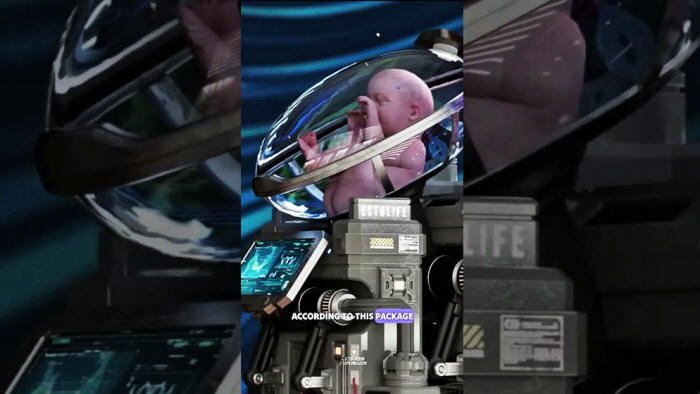That Artificial Womb Video isn't Real
-
But Scientists say it
Could Be -
by Rachel Moss
December 13, 2022
from
HuffingtonPost Website

The video looks like
science fiction,
but experts in the field
tell us
it's not such a leap after
all...
It looks like a scene from
The Matrix.
Rows upon rows of babies are developing in the "world's
first artificial womb facility," which can supposedly
incubate up to 30,000 lab-grown children per year.
But here's the thing - it's not actually "real"...
The futuristic far below video that's being widely shared on social media
is the brainchild of Hashem Al-Ghaili, a producer and
filmmaker with a background in molecular biology.
On
his website, Al-Ghaili says he uses his,
"background in science and technology to develop brand-new
concepts".
He speaks of "imagining the future," though some online have
clearly mistaken his latest film as a real-life advert.
In the video, for a fictional facility called EctoLife,
we hear that,
artificial wombs could provide a solution for
cancer patients who've had their uteruses removed, that they
could reduce pregnancy complications, and that the pods will
help countries experiencing population decline, such as Japan,
Bulgaria, South Korea.
Hashem says he believes this technology is ready and that we
could see such facilities in as little as 10 years.
But what do Scientists Working in this
Field really Think?

Hashem Al-Ghaili
Professor Joyce Harper, head of the Reproductive
Science and Society Group, at UCL Institute for Women's
Health, believes we might.
Her book, 'Your Fertile Years', has a whole chapter dedicated to
what the future of reproduction may look like.
"I have no doubt that at some point, most people will be
produced by
IVF. And that this [EctoLife] would be a
possibility.
In science, I think you should never say never," she tells
HuffPost UK.
"If you just think of the last 50 years and what we've
achieved that you would never have thought of.
I'm quite old, so I remember watching Star Trek, where they
were doing video calls, and you know, I never thought I'd be
video calling my kids on FaceTime."

Hashem Al-Ghaili
She points out that the first four weeks of gestation can
actually be completed in an IVF lab (women are typically four
weeks pregnant when an embryo is transferred).
And now, premature babies can be cared for from around 21 weeks
in an incubator within a neonatal unit.
"A pregnancy is normally 40 weeks and over half of it now
can be done in the neonatal unit," she says.
"So really, it's under 20 weeks [of gestation time], that
scientists have got to figure out how to do safely. It's not
really that far away."
Prof. Harper highlights that
lambs have been been developed from
earlier prematurity, but we're some way off completing this with
humans.
"I do think that this will happen, but not in my lifetime,"
she says.
Andrew Shennan, who is professor of Obstetrics at King's
College London, also says the video isn't as far-fetched as you
may think.
"From a theoretical standpoint it's possible," he says of
artificial wombs.
"It's just a matter of providing a correct environment with
fuel and oxygen and I do think the technologies are there to
be able to achieve that.
"There are lots of examples where babies come out extremely
early and are very well looked after in incubators, which is
a very naive form of what you're talking about, and they're
being fed by tubes down to their stomach.
"When we put people on things like heart bypasses or other
organ bypasses, we are theoretically giving them what they
need from a machine."

Hashem Al-Ghaili
"Though the artificial womb itself wouldn't pose a large
challenge, the early stages of development - where the
organs are forming in the first 12 weeks - would be harder
to navigate," he adds.
Prof. Shennan also says there's,
"all sorts of biochemical and immunological things that go
on that we probably don't understand yet" in relation to
antibodies passed on from the mother.
This would require further research.
There's also ethics to consider, because this technology will
only be developed if there's a need and a desire for it.
The below EctoLife concept video talks about
offering an "elite package" where babies will be genome edited
to alter their hair color, skin tone, physical strength, height
and level of intelligence.
Interestingly, Prof. Harper thinks future generations will be
unfazed by this on an ethical level.
She once took part in an
Oxford Union debate on genome editing and whether it would
"undermine the nature of humanity".
"I spoke for the motion because I think it will, but I can
tell you I lost spectacularly," she says.
"Young people don't have those hesitations that we have."
She thinks the technology will come, but the real question worth
asking is whether we'll want it.
"How many people will find that uncomfortable?
And how many
people will think that's great?" she asks.
Though she personally veers towards the former, she does concede
that this could reduce pregnancy complications and give same-sex
male couples better reproductive choices without the need for a
surrogate, so it's worth considering.
"I have no doubt that in the future, we will have an
artificial human womb, but for now, there are many technical
and social issues we have to overcome," she says.
But Prof. Shennan thinks those ethical battles were largely
covered with the advent of IVF.
"When test tube babies first happened, there was a big
debate and push back, but the test tube baby is now widely
accepted," he says.
"Surrogacy is also a very common phenomenon now. In a way,
you're just asking the machine to be the surrogate, instead
of another woman.
"So I think from an ethical standpoint, I don't think it's
that challenging. Yes, they'd have to be legislation if we
went down that route.
But if you think of the nuts and bolts of the concept, I
think we've already crossed that bridge."
Video






